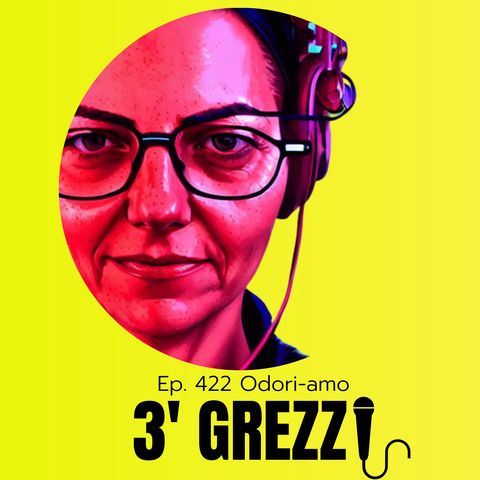3' grezzi Ep. 422 Odori-amo

Scarica e ascolta ovunque
Scarica i tuoi episodi preferiti e goditi l'ascolto, ovunque tu sia! Iscriviti o accedi ora per ascoltare offline.
Descrizione
L'odore come ultimo baluardo che resiste alla digitalizzazione. Non esiste ancora una app che possa riprodurre perfettamente l'esperienza di sentire un odore. TRASCRIZIONE [ENG translation below] Ci siamo così tanto...
mostra di piùTRASCRIZIONE [ENG translation below]
Ci siamo così tanto abituati oggi a non sentire quelli che noi chiamiamo odori spiacevoli, che già la parola odore ci fa pensare a qualcosa di negativo, mentre odore dovrebbe essere l'accezione neutra, che non è puzza e non è profumo.
L'odore è anche uno dei nostri sensi molto particolare, un senso chimico, perché quando noi sentiamo un odore stiamo respirando delle molecole volatili che stanno volando, quindi volatili e volanti. E a differenza del tatto e del gusto, l'olfatto è un senso che ci investe, cioè anche se noi non vogliamo sentire un odore lo sentiamo perché l'unico modo per non sentire l'odore è tapparsi il naso e se ci tappiamo il naso non respiriamo. Vabbè, direte voi, si può respirare con la bocca, ma una persona non può vivere solo respirando con la bocca.
L'odore ha anche la caratteristica magica di essere ancora uno dei pochi baluardi che resiste al dominio digitale. Perché se infatti possiamo vedere tramite video le performance, possiamo sentire i suoni riprodurli con diffusori acustici, ci sono dispositivi che si possono collegare al computer o al cellulare, che riproducono anche i movimenti, quindi anche il tatto può essere quasi riprodotto, dal punto di vista digitale, però l'odore no, l'odore ancora resiste perché ancora non si è riusciti a diffondere l'odore attraverso lo schermo del computer e ancora, se tu vuoi andare a sentire un odore, devi proprio andare lì, fisicamente bisogna esserci.
L'odore ha anche un'altra caratteristica, quella che è il modo in cui noi percepiamo gli odori è messo in collegamento diretto con le aree del cervello, le zone che elaborano le emozioni e quelle che controllano la memoria. Ecco perché sentire un odore improvvisamente ci fa riapparire davanti a noi la scena in cui li avevamo sentiti, magari da bambine o da bambini. Anche questo è il motivo per cui è così difficile descrivere gli odori, perché appunto vengono recepiti nella zona che controlla le emozioni, non la zona verbale che ci fa parlare, e infatti parlare delle emozioni è molto difficile.
Quindi un invito, odoratevi intorno, non abbiate paura degli odori e rilassatevi nel godervi gli odori, e non siate troppo schizzinosi, perché a volte è solo la cultura che ci fa pensare che certi odori siano negativi. Quindi odori-amo.
TRANSLATION
Today we are so accustomed to not smelling what we call unpleasant smells, that the word smell already makes us think of something negative, while smell should be the neutral meaning, which is not stink and it is not perfume.
Smell is also one of our very particular senses, a chemical sense, because when we smell something we are breathing in volatile molecules that are flying, therefore volatile and flying. And unlike touch and taste, smell is a sense that invests us, that is, even if we don't want to smell, we do, because the only way not to smell is to plug our nose and if we plug our nose we do not breathe. Oh well, you say, you can breathe through your mouth, but a person cannot live by breathing through the mouth alone.
Smell also has the magical characteristic of still being one of the few bulwarks that resists digital domination. Because if in fact we can see performances via video, we can hear sounds reproduced with loudspeakers, there are devices that can be connected to the computer or mobile phone, which also reproduce the movements, so even the touch can almost be reproduced digitally, but not the smell, the smell still endures because we haven't yet managed to spread the smell through the computer screen and still, if you want to experience a smell, you really have to go there, physically, you have to be there.
Smell also has another characteristic, which is that the way we perceive smells is put in direct connection with the areas of the brain, the areas that process emotions and those that control memory. That's why smells suddenly make the scene in which we smelled them reappear before us, perhaps as we were children. This is also the reason why it is so difficult to describe smells, because they are perceived in the area that controls emotions, not the verbal area that makes us talk, and in fact talking about emotions is very difficult. So an invitation, go and smell around, don't be afraid of smells and relax while enjoying smells, and don't be too picky, because sometimes it's just the culture that makes us think that certain smells are bad. So smell-love [the wordplay "odori-amo" combines the act of "odorare" (to smell) and the verb "amare" (to love) in Italian].
Informazioni
| Autore | M. Cristina Marras |
| Organizzazione | M. Cristina Marras |
| Sito | - |
| Tag |
Copyright 2024 - Spreaker Inc. an iHeartMedia Company

Commenti